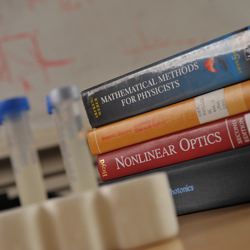

Rodolfo Capdevilla
Capdevilla received the first-ever Ganey Community-Based Research Graduate Stipend for the project “Inspiring High School Students to Enter Stem Careers Using Quantum Physics Demos.” His team of researchers includes Mitchell Wayne, professor of physics; Kenneth Cecire of the national QuarkNet Program; and Don Howard, a professor of philosophy. The stipend is $3,000.
The group will design and test demonstrations in quantum physics that are embedded in career orientation seminars in order to increase STEM engagement in local high schools, beginning with Adams High School, La Lumiere School, and Trinity School, and expanding to additional schools in the area. A separate demonstration will be created to engage students’ parents.
The researchers will collect data from surveys and interviews after the demonstrations to measure students’ engagement in extracurricular STEM activities. They will also track the short-term impact of the demonstration on students’ grades and, in two or three years, assess the long-term impact by tracking students who pursue STEM-related careers after high school. Once established, the program could be distributed nationally and internationally by QuarkNet.
Nancy Michael
Michael received a Ganey Community-Based Research Seed Grant for the project “Improving Academic Achievement through Brain Health and Growth Mindset Education. The grant is for $6,000, with another $1,000 if the work produces a paper or conference presentation within a year.
Michael, along with Andrea Christensen, an assistant professional specialist in the Institution for Educational Initiatives and Velshonna Luckey, youth program director at the Robinson Community Learning Center, will study whether an age-appropriate Brain Health Curriculum developed with underlying growth mindset themes improves mindset, academic self-concept, and behavioral and educational outcomes. Researchers will develop activities, aligned with Indiana State Science Standards that deliver brain health messages with growth-mindset themes and positive behavioral change strategies.
Using surveys before and after the activities showing participants’ intention to change relevant behaviors, Robinson Community Learning Center behavioral observations, and validated measures on mindset, self-efficacy, and academic self-concept, they will assess whether the curriculum improved behavior choices in and out of class at the end of the semester and six months later. Validated activities will be developed into a curriculum for public schools in South Bend and nearby. Neuroscience and behavior majors at the University of Notre Dame will help implement the curriculum.